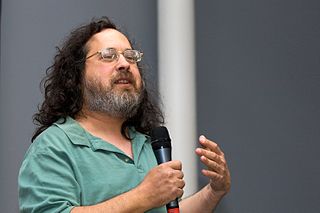

By NicoBZH from Saint Etienne
ON A COUPLE of occasions last week (and on other occasions quite recently) we wrote about the Hammond trial [1, 2], which oddly enough had appointed as its judge the spouse of a Stratfor client. Here’s Richard Stallman’s letter, which was quoted by a news site [1] the other day:
Dear Judge Preska I’ve been proud to call myself a hacker since 1971. That’s when I was hired by the MIT Artificial Intelligence Lab to join the team that developed the lab’s operating systems — for which the unofficial job title was “system hacker”. My subsequent hacking career has included developing the GNU operating system, which is often erroneously called “Linux”, and the legal hack of “copyleft” which uses copyright law to ensure that all users of a program are free to redistribute it and change it. I’ve received numerous awards and doctorates for my hacking, and have been invited twice to publish articles in law reviews.
Being a hacker means practicing and enjoying playful cleverness. (See stallman.org/articles/on-hacking.html.) It does not particularly have to do with breaking security. Indeed, no one ever broke security on the AI lab’s system, because we decided not to implement any.
That decision, made by the original team members who became my mentors, was not taken lightly: it was the result of careful political and philosophical thought. Instead of keeping most users (those without “privileges” — which already sounds like a prison) shackled so that they could not hurt each other, we thought the lab members and guest users could learn to get along as a community, choosing not to hurt each other. And they did!
This example is not unusual for hackers. From the beginning, hackers’ taste for playful cleverness has often gone along with a sense of social responsibility, concern for others’ well-being. Jeremy Hammond is a fine example of a socially responsible hacker. He found a clever way to expose the many nefarious deeds that Stratfor was planning and proposing.
People should not be allowed to enter others’ computers without permission; but when punishing someone for virtual trespassing, we ought to consider his motive. Those who trespass as part of a nonviolent protest, either physically or virtually, should not receive severe punishments. Those who act neither for gain nor for malice should not receive severe punishments. Imagine where our country would be if the civil rights and antiwar sit-ins had been punished by years in prison! If we do not want the US to be like Putin’s Russia, imposing long sentences on protesters, we must steer clear of doing so. That applies to virtual protests as well as physical ones.
I therefore respectfully suggest that Hammond be sentenced to community service. To make use of his skills and abilities, this service could consist of helping nonprofit organizations protect their personal data. Sincerely, Richard Stallman Lead developer of the GNU system (gnu.org) President, Free Software Foundation (fsf.org) MacArthur Fellow Internet hall-of-famer (internethalloffame.org)
Foundation president Richard Stallman tried to get Stratfor hacker Jeremy Hammond’s judge to only hand down a community service sentence. Hammond, instead, received 10 years in jail today.
Stallman provided VentureBeat with his letter in full, which you can find below.
As Richard Stallman's GNU Project turns 30, the Free Software Foundation aims for a cloud that foils state-sponsored snooping
Finding the best way to process your data can be complicated. I recently became involved in a project where I needed to filter out data from an RF signal. Because I am not an RF designer with years of experience, I actually had to do a bit of reinventing the wheel. With a recording of data in hand, one option was to try and feed that data into a microcontroller, write up some test code, and then analyze the results. Another option was to use GNU Octave.
GNU Octave is a MATLAB-type environment that allows for numerical simulation. Information about the history of GNU Octave can be found here. MATLAB is an interpreted language that is coupled with the program by the same name. The main difference between MATLAB and GNU Octave is that MATLAB costs many thousands of dollars, whereas GNU Octave is an open-source program.
In benchmarks, Java-based frameworks enjoy a big performance lead
GCC developers from multiple companies are beginning to reach agreement that it's time for Java to be turned off by default in GCC. The Java compiler support in GCC is in the form of GCJ, but it doesn't see much active development these days with more of the Java work happening in OpenJDK. Developers are looking to disable Java from the default GCC build process but to potentially replace it with the Go or ADA languages.